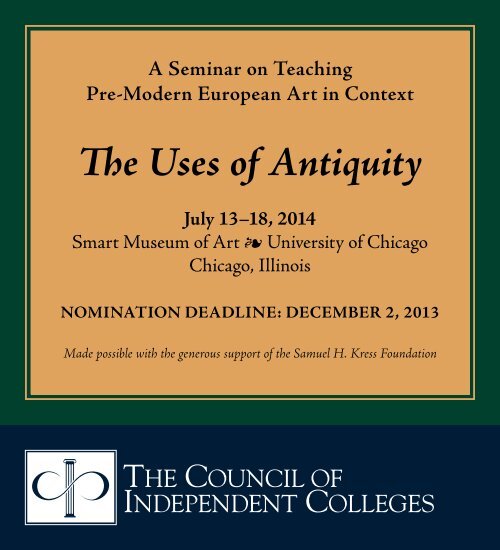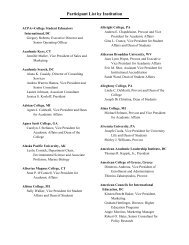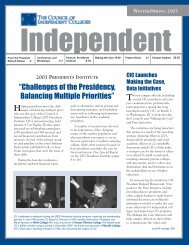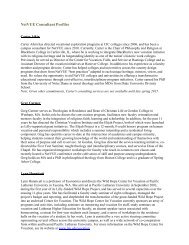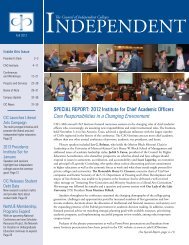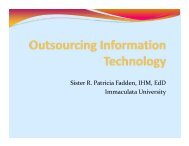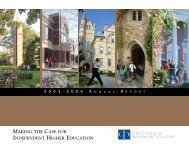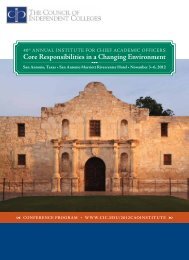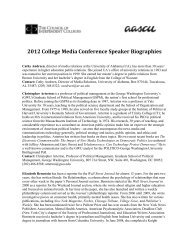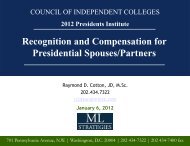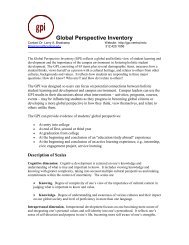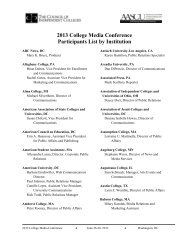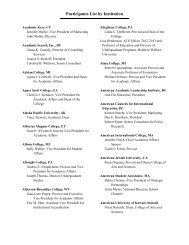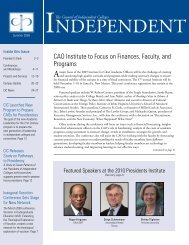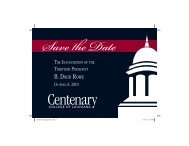Download the 2014 Art History Seminar brochure. - The Council of ...
Download the 2014 Art History Seminar brochure. - The Council of ...
Download the 2014 Art History Seminar brochure. - The Council of ...
You also want an ePaper? Increase the reach of your titles
YUMPU automatically turns print PDFs into web optimized ePapers that Google loves.
A <strong>Seminar</strong> on Teaching<br />
Pre-Modern European <strong>Art</strong> in Context<br />
<strong>The</strong> Uses <strong>of</strong> Antiquity<br />
July 13–18, <strong>2014</strong><br />
Smart Museum <strong>of</strong> <strong>Art</strong> 4 University <strong>of</strong> Chicago<br />
Chicago, Illinois<br />
Nomination Deadline: December 2, 2013<br />
Made possible with <strong>the</strong> generous support <strong>of</strong> <strong>the</strong> Samuel H. Kress Foundation
A <strong>Seminar</strong> on Teaching<br />
Pre-Modern European <strong>Art</strong> in Context<br />
<strong>The</strong> Uses <strong>of</strong> Antiquity<br />
July 13–18, <strong>2014</strong> 4 Chicago, Illinois<br />
Smart Museum <strong>of</strong> <strong>Art</strong> 4 University <strong>of</strong> Chicago<br />
Renaissance and Baroque artists who adopted classical styles,<br />
quoted from ancient artworks, and depicted ancient subject<br />
matter had many different purposes in mind. <strong>The</strong> early<br />
modern European response to antiquity could, among o<strong>the</strong>r<br />
things, assert cultural authority; serve as a morality tale about<br />
<strong>the</strong> dangers <strong>of</strong> empire or <strong>the</strong> inevitable decline <strong>of</strong> civilizations;<br />
express a mood <strong>of</strong> nostalgia; play out contemporary rivalries;<br />
and advertise <strong>the</strong> learning <strong>of</strong> <strong>the</strong> artist or portrait sitter.
This seminar will be led by Rebecca Zorach, pr<strong>of</strong>essor <strong>of</strong> art history and <strong>the</strong> college at <strong>the</strong> University <strong>of</strong> Chicago,<br />
and will be held at <strong>the</strong> University <strong>of</strong> Chicago’s Smart Museum <strong>of</strong> <strong>Art</strong>. It will take as its starting point European<br />
objects spanning <strong>the</strong> years 1300–1800 at <strong>the</strong> Smart Museum and participants will have <strong>the</strong> chance to examine prints<br />
and rare printed books in <strong>the</strong> Regenstein Library's Special Collections Research Center, principally <strong>the</strong> very large<br />
collection <strong>of</strong> <strong>the</strong> Speculum Romanae Magnificentiae and related prints after Roman monuments and antiquities,<br />
considering <strong>the</strong> role <strong>of</strong> prints, books, and o<strong>the</strong>r small objects in disseminating and popularizing classical styles<br />
and imagery. Moving beyond <strong>the</strong> European early modern period, <strong>the</strong> seminar also will visit o<strong>the</strong>r local sites—<strong>the</strong><br />
Oriental Institute, campus and neighborhood murals, and buildings such as <strong>the</strong> nearby Museum <strong>of</strong> Science and<br />
Industry—to think about how participants can use <strong>the</strong>ir own local resources creatively to discuss with students<br />
ways in which artists, architects, patrons, and o<strong>the</strong>rs have understood and reinterpreted <strong>the</strong> past. <strong>The</strong> seminar will<br />
examine recent and older scholarship on <strong>the</strong> uses <strong>of</strong> <strong>the</strong> past and draw on <strong>the</strong> expertise and teaching experience <strong>of</strong><br />
participants. For many <strong>of</strong> our students, differences between an ancient Greek temple and a Renaissance church (or<br />
a 19th-century Beaux-<strong>Art</strong>s museum, for that matter) barely register. But <strong>the</strong> benefits <strong>of</strong> teasing out <strong>the</strong> nuances <strong>of</strong><br />
references and associations go beyond awareness <strong>of</strong> <strong>the</strong> chronology <strong>of</strong> style. Pedagogical discussions will address close<br />
looking, <strong>the</strong> relationship <strong>of</strong> texts to objects, and ways faculty members can help students think critically about <strong>the</strong><br />
texture <strong>of</strong> history and <strong>the</strong> practices and decisions <strong>of</strong> artists.<br />
Zorach teaches late medieval and Renaissance art, primarily French and Italian; gender studies and critical<br />
<strong>the</strong>ory; print culture and technology; and contemporary activist art. Her books include <strong>The</strong> Passionate Triangle (2011)<br />
and Blood, Milk, Ink, Gold: Abundance and Excess in <strong>the</strong> French Renaissance (which received <strong>the</strong> Society for <strong>the</strong> Study<br />
<strong>of</strong> Early Modern Women 2005 Book Award), both published by <strong>the</strong> University <strong>of</strong> Chicago Press. In addition, she has<br />
created catalogues for several exhibitions, including <strong>The</strong> Virtual Tourist in Renaissance Rome: Printing and Collecting<br />
<strong>the</strong> Speculum Romanae Magnificentiae produced in conjunction with <strong>The</strong> Speculum Romanae Magnificentiae Digital<br />
Collection, and Paper Museums: <strong>The</strong> Reproductive Print in Europe 1500–1800, co-edited with Elizabeth Rodini.<br />
Named in memory <strong>of</strong> David and Alfred Smart—<strong>the</strong> publishers <strong>of</strong> Esquire, Coronet, and o<strong>the</strong>r magazines—<strong>the</strong><br />
Smart Museum <strong>of</strong> <strong>Art</strong> first opened to <strong>the</strong> public in 1974. <strong>The</strong> institution became <strong>the</strong> central repository for <strong>the</strong><br />
University <strong>of</strong> Chicago’s fine arts collection with some holdings dating back to <strong>the</strong> university’s founding in <strong>the</strong> 1890s.<br />
From <strong>the</strong> beginning, <strong>the</strong> Smart was guided by an educational mission focused on teaching and research and by a<br />
commitment to make <strong>the</strong> arts accessible to <strong>the</strong> university community and wider public through its collection and<br />
special exhibitions. Over <strong>the</strong> past decades, <strong>the</strong> Smart’s collection has expanded significantly, both through major gifts<br />
and through an active acquisitions program. Likewise, <strong>the</strong> scope <strong>of</strong> <strong>the</strong> museum’s mission has grown substantially.<br />
Initially run from within <strong>the</strong> art history department, <strong>the</strong> Smart gained administrative autonomy in 1983 and adopted<br />
a broader focus on public outreach, first within <strong>the</strong> campus community and <strong>the</strong>n throughout <strong>the</strong> city. In <strong>the</strong> 1990s,<br />
<strong>the</strong> museum began a seminal phase <strong>of</strong> programmatic expansion, launching an innovative educational outreach<br />
program for local public schools as well as a faculty-curated exhibition program.<br />
Daphne Fleeing from Apollo<br />
Master <strong>of</strong> <strong>the</strong> Apollo and Daphne Legend, Italian (Florentine), active c. 1480–1510<br />
Italian, c. 1500, Oil, formerly on panel, transfered to canvas<br />
25⅝ x 53¾ in.<br />
Smart Museum <strong>of</strong> <strong>Art</strong>, Gift <strong>of</strong> <strong>the</strong> Samuel H. Kress Foundation<br />
Participants, Location, and<br />
Expenses<br />
Up to 20 individuals will be selected by competitive<br />
nomination. Participants must be full-time faculty<br />
members who regularly teach art history and whose<br />
institutions are members <strong>of</strong> <strong>the</strong> <strong>Council</strong> <strong>of</strong> Independent<br />
Colleges. <strong>The</strong>re is no seminar fee. Lodging and some<br />
meals will be covered with support from CIC, <strong>the</strong><br />
Smart Museum, and <strong>the</strong> Samuel H. Kress Foundation.<br />
Participants or <strong>the</strong>ir institutions are expected to<br />
cover <strong>the</strong> cost <strong>of</strong> transportation to <strong>the</strong> seminar at <strong>the</strong><br />
Smart Museum <strong>of</strong> <strong>Art</strong> in Chicago, Illinois, although<br />
some funds are available to assist a limited number <strong>of</strong><br />
participants who o<strong>the</strong>rwise would be unable to attend.<br />
Please note that spouses and friends are not permitted to<br />
stay in <strong>the</strong> provided housing at <strong>the</strong> University <strong>of</strong> Chicago<br />
nor are spouses and friends permitted to attend <strong>the</strong><br />
seminar.<br />
Nomination Process<br />
Faculty members who wish to participate in <strong>the</strong> seminar<br />
should ask <strong>the</strong> chief academic <strong>of</strong>ficer <strong>of</strong> <strong>the</strong>ir institution<br />
to send a letter <strong>of</strong> nomination to CIC. <strong>The</strong> letter should<br />
detail <strong>the</strong> nominee’s teaching qualifications and explain<br />
<strong>the</strong> opportunities he or she will be given upon returning<br />
to campus to use what has been learned in his or her<br />
teaching. Each institution may nominate more than<br />
one individual, and faculty members in all academic<br />
ranks are eligible to participate. <strong>The</strong> nomination form<br />
is available online at www.cic.edu/<strong>Art</strong><strong>History</strong>. Each<br />
nomination package should consist <strong>of</strong> <strong>the</strong> following:<br />
a. Nomination letter from <strong>the</strong> chief academic <strong>of</strong>ficer;<br />
b. Completed nomination form;<br />
c. Nominee’s curriculum vitae; and<br />
d. Nominee’s statement <strong>of</strong> reasons for wishing to<br />
participate in <strong>the</strong> seminar and exploration <strong>of</strong><br />
anticipated outcomes (no more than one page).<br />
Nomination Deadline<br />
Please submit <strong>the</strong> completed nomination in a single<br />
package to CIC by Monday, December 2, 2013.<br />
Selection <strong>of</strong> participants will be announced Friday,<br />
February 28, <strong>2014</strong>.<br />
Nomination materials should be submitted online. For<br />
questions about <strong>the</strong> seminar or <strong>the</strong> nomination process,<br />
please contact Stephen Gibson, director <strong>of</strong> programs,<br />
<strong>Council</strong> <strong>of</strong> Independent Colleges, at (202) 466-7230 or<br />
sgibson@cic.nche.edu.
www.cic.edu/arthistory<br />
One Dupont Circle, NW, Suite 320 • Washington, DC 20036-1142<br />
Phone: (202) 466-7230 • Fax: (202) 466-7238<br />
Email: cic@cic.nche.edu • www.cic.edu


